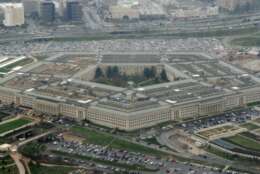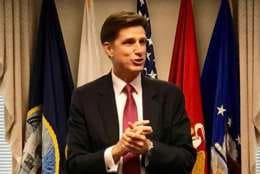On DoD
-
Data is one of the government's strategic assets. But Big Data can get too big, and now data leaders have been talking about data downsizing.
August 11, 2020 -
The document establishes what the new service is and where it will go from here.
August 10, 2020 -
The number of open recommendations that are at least five years old grew from 80 in 2019 to 170 this year.
August 10, 2020 -
Sens. Mark Warner (D-Va.) and Tim Kaine (D-Va.), along with Ben Cardin (D-Md.) and Chris Van Hollen (D-Md.), asked Senate leadership to include a provision in the next stimulus bill to extend Section 3610 provisions that provide paid leave, including sick leave, to employees and subcontractors until Dec. 31, 2021.
August 04, 2020 -
Dana Deasy, the DoD CIO, said in a wide-ranging press conference that the Pentagon plans to reaward the JEDI contract in late August and the new chief data officer is on a 90-day listening tour that will help guide a new plan of action.
August 03, 2020 -
Lawmakers probably won't have time to slip ideas to better space procurement in this year's defense policy bill.
August 03, 2020 -
Nicolas Chaillan, the Air Force’s chief software officer, said the service is testing its cloud native access point approach through Platform One with the F-35 and Ground Based Strategic Deterrent (GBSD) teams.
July 30, 2020 -
The Defense Department is seeing a high percentage of 18-24 year-olds infected with COVID.
July 30, 2020 -
The director of the Hudson Institute's new Center for Defense Concepts and Technology shares details on the center's mission and focus areas.
July 30, 2020 -
This week on Fed Access, Jon Harper, managing editor of National Defense Magazine, joins host Derrick Dortch to discuss how the Covid-19 pandemic is affecting the Department of Defense and contractors who do business with the agency.
July 29, 2020 -
Forces Command IG Col. Patrick Wempe said they "may not have the life experience or the military experience" to handle the situations.
July 29, 2020 -
For the military, the pandemic is starting to echo lessons of war and shape the defense medical system in new ways, just as conflicts did in the past.
July 27, 2020 -
The bipartisan House provision, advocated by Rep. Jim Langevin, would also work with federal departments to develop a U.S. national cyber strategy.
July 27, 2020 -
Agencies that handle classified information have had to perform a kind of juggling act to ensure their employees’ safety from the coronavirus while also guaranteeing that the work that needs to gets done.
July 23, 2020 -
Army leaders say the services they're building now are "cloud agnostic," and can be moved to a DoD-wide enterprise cloud when and if one comes to pass.
July 23, 2020















